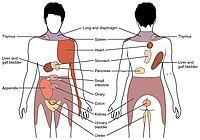
Photo from wikipedia
Background Chronic abdominal wall pain arising from the myofascial structures is termed abdominal myofascial pain syndrome and is an important cause of refractory abdominal pain that utilizes significant health care… Click to show full abstract
Background Chronic abdominal wall pain arising from the myofascial structures is termed abdominal myofascial pain syndrome and is an important cause of refractory abdominal pain that utilizes significant health care costs. The current literature is vague on its management. Design The author presents a prospective audit of a structured management pathway and discusses the pathophysiology of abdominal myofascial pain syndrome. The objective was to identify an effective and durable treatment for the individual patient and evaluate patient satisfaction with the management pathway. Methods Over a three-year period, 120 patients diagnosed with abdominal myofascial pain syndrome were included in a structured management pathway and were prospectively audited at a tertiary care university hospital. Results Patient satisfaction with the pathway was high. Trigger point injection with local anesthetic was useful in diagnosis but ineffective in providing durable relief. Trigger point injection with steroids and pulsed radiofrequency treatment of trigger point(s) were effective therapeutic interventions, providing durable relief lasting six months in 32% and 60%, respectively. There was improvement reported in pain intensity scores, quality of life, anxiety, and depression scores following the interventional management of abdominal myofascial pain syndrome. Conclusions Abdominal myofascial pain syndrome is often unrecognized, especially in patients with a history of visceral inflammation. The suggested pathway may be an option in its management. Trigger point injection with steroids may have a role in the differential diagnosis of chronic abdominal pain.
Journal Title: Pain Medicine
Year Published: 2018
Link to full text (if available)
Share on Social Media: Sign Up to like & get
recommendations!